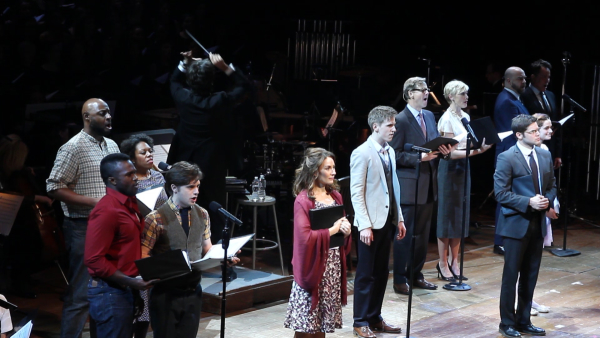Parade in Concert
Jason Robert Brown’s Tony-winning score gets a concert staging just steps away from where it premiered at Lincoln Center.

(© Seth Walters)
Jason Robert Brown received a hero's welcome as he took the stage of Avery Fisher Hall to conduct Manhattan Concert Productions' one-night performance of Parade. He hadn't even lifted his baton, but already the applause was deafening. Brown (who is currently represented on Broadway with Honeymoon in Vegas) penned the score of Parade (book by Alfred Uhry) for Lincoln Center Theater in 1998, his first Broadway show as a composer. It played 39 previews and a mere 85 performances, but it garnered that season's Tony Awards for Best Book and Score. Since then, Brown has gained a cult following from shows like his tuneful two-hander The Last Five Years (recently turned into a movie) and his gorgeous Broadway flop The Bridges of Madison County. True JRB fans weren't going to miss an opportunity to hear the composer's earlier work, especially as arranged for a full orchestra and a chorus of over a hundred voices. The evening did not disappoint, even if some of the performances did.
Set in 1913, Parade tells the true story of Leo Frank (Jeremy Jordan), a Brooklyn-born Jewish superintendent of an Atlanta pencil factory who is accused of the murder of one of his employees, Mary Phagan (an appropriately chirpy Emerson Steele). Leo's wife, Lucille (Laura Benanti), attempts to defend her husband, but right-wing rabble-rouser Tom Watson (Ramin Karimloo, skillfully handling the show's creepiest lines and worst songs) is determined to turn the town against him. Prosecutor Hugh Dorsey (a severe John Ellison Conlee) thinks he can ride a conviction into the governor's mansion. Reporter Britt Craig (the not-altogether-present Andy Mientus) is just after a good story, while Frankie Epps (Charlie Franklin, hitting all the right notes but with a distracting Yankee accent) wants justice for his friend Mary. All this is set against the backdrop of the city of Atlanta and its Confederate Memorial Day Parade, a perennial celebration of the brave Georgians who died fighting in the "War of Northern Aggression."
From the evening's earliest number, the anthemic "The Old Red Hills of Home," it was obvious we were hearing something special. The chorus (assembled from representatives of a dozen choirs across North America) embodied the people of Atlanta in a way that has likely never been achieved, significant for a show that is so much about mob sentiment. This wall of voices, when raised against our protagonists, felt like a tsunami threatening to drown everything in its wake.
In his portrayal of the uptight and unhappy Leo, Jordan opted for extremes, and it mostly paid off. He brought to the stage a high-strung nervousness. He entered tugging at his too-tight collar, an on-the-nose foreshadowing of events to come. Still, his voice soared, rising high above the multitudinous chorus in his first number, "How Can I Call This Home?" His rendition of "Come Up to My Office," a song that imagines Frank as a lech, was the most committed I've seen. Snakelike, Jordan held out the last syllable of "office" before skeevily feeling up a trio of young female employees. He ended the song crouched on his chair, rubbing his hands together like the repulsive Gollum from Lord of the Rings. This crude (and obviously false) minstrelsy contrasted highly with the real and growing tenderness he showed in the scenes he shared with his wife.
Benanti brought a meekness to Lucille that was not found in the role's big-voiced originator, Carolee Carmello. As portrayed by Benanti, Lucille is a dainty Southern belle who finds an increasingly assertive voice out of necessity. We watched the beginnings of this transformation in "You Don't Know This Man," a song in which she bravely defends her husband before a crowd of onlookers. By the second act, Benanti had let the full power of her voice out, culminating in her high-flying duet with Jordan, "All the Wasted Time."
Of course, the evening's real showstopper was Joshua Henry as the prosecution's star witness, Jim Conley. Henry brought the house down with "That's What He Said," performing as if we the audience were the jury he was trying to convince. This toe-tapping musical hearsay was simultaneously rollicking and terrifying, with the massive chorus shouting "hang him" as Henry belted out the Frank trial's most damning testimony. Brown utilized the chorus to chilling effect in Henry's second-act number, the bluesy "Feel the Rain Fall," with over a hundred vocalists snapping and clapping along with Brown as if they were inmates on a chain gang. Les Misérables, eat your heart out.
With sweeping orchestrations, Brown fully captured the grandeur of his score in new and exciting ways. His violent percussion arrangements were particularly inspired. And since the show is called Parade, it was nice to hear a robust brass and woodwinds section (compliments of the New York City Chamber Orchestra), as one might get from a real marching band. We'll likely never hear something on a Broadway stage as immense as this thrilling concert. But upon revisiting Parade, I'm certain that it won't stay far from the Great White Way for long.








